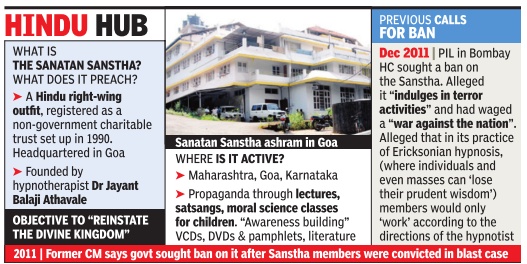Sanatan Sanstha
This is a collection of articles archived for the excellence of their content. |
Contents |
A brief history

Sep 24 2015
Out to `build one nation with one identity' its own way
Suraj P Kaisuvker The Sanatan Sanstha, headquartered at Ramnathi, a village 30km from Panaji, is on a mission to “build one nation with one identity“. Founded by UK-returned hypnotherapist Jayant Balaji Athavale in 1990 as Sanatan Bharatiya Sanskruti Sanstha, and renamed Sanatan Sanstha in 1999, the outfit has come a long way in its “quest“ to “reinstate the divine kingdom“, also hitting the headlines for wrong reasons.
The recent arrest of Samir Gaikwad in connection with CPI veteran and rationalist Govind Pansare's murder has the Sanstha facing probe lights again and more calls for its ban. Investigators found a phone conversation Gaikwad reportedly had with another Sanstha member Rudra Patil just before Pansare's murder, that led to the arrest. The Sanstha defends Gaikwad saying he merely distributes Sanatan Prabhat copies.
Patil's also an accused in the 2009 pre-Diwali Margao blast. During the case's hearing, prosecution alleged Patil had, between June and October 2009, conspired to terrorize those involved in Goa's Narakasura celebrations. In that case, two of its sadhaks (seekers) died after bombs they were said to be carrying in their scooter went off. The Pune SIT probing rationalist Narendra Dabolkar's murder mentioned the possible role of Sanstha members. On November 8, 2009, the Bandora village panchayat at a gram sabha passed a resolution demanding action against the Sanstha. Its premises have been raided by the police and NIA. Maharashtra too sought a ban on it in 2011.
But the Sanstha insists it “believes in democratic protest; doesn't propagate violence“. Its website instructs followers on myriad issues, from hair care to spiritual knowledge. It's openly against rationalists like Dabholkar and Pansare and also against the likes of M M Kalburgi who have no faith in gods and sadhus.Even against them, the Sanstha claims it fights “using democratic means only“.
Operating out of an expansive white-and-yellow building -that has allopathic and ayurvedic clinics and an audio-video production facility -the Sanstha propagates its beliefs through lectures, satsangs, VCDs and printed matter. Its publication Dainik Sanatan Prabhat claims it has 95,000 subscribers and is published in Hindi, Marathi, English and Kannada; printed out of Ratnagiri, Goa, Mumbai, Pune and Hubli-Dharwad.
The Sanstha's presence in Goa was first felt when it started preaching against the glorification of Narakasura, a demon Krishna slayed. On Diwali-eve, Narakasura's effigies are taken out in processions. This, the Sanstha objected to, demanding that Krishna be glorified, not the demon.
Of the thousands that visit the Ramnathi ashram -“seekers“ looking to “sacrifice their mind, body and wealth“ to its mission -many are women. Revenue is also generated through sales of perfume, incense sticks, soaps, camphor, gomutra-ark (a cow-urine concentrate) and powder. All these “conform to the Hindu way of life“.
Foreigners, sources say , frequent the ashram. On October 23, 2009, a case was registered against it for illegally giving foreigners accommodation without filling in the mandatory `C' form. Officially, the Sanstha insists it has no affiliations with any group, but members have talked of its links with hardline outfits.
The Sanstha has offices and organises protests (the most recent against Amir Khan's PK) in almost all Karnataka districts.
Vision of a "Hindu nation"
The Times of India, Jun 19, 2016

Radheshyam Jadhav
For this cult, critics are `demons' In Sanatan Sanstha's vision of a `Hindu nation', there will be no progressive films, no mingling of the sexes and all music, food and drink will be `spiritual'. But neither the lifestyle manual nor the allegations of murder are putting fans off Malati Jadhav, a housewife in Sangli in western Maharash tra, recently opened her door to an unknown group of women who had come armed with books, posters and a bundle of brochures. What followed was a bizarre experience and the memory of it still unnerves her. As soon as they stepped in, one of them told me that there were `negative vibrations' in the room and that I need to have the photo of one Jayant Athavale to get rid of them. One woman pointed to a family photograph and said that the `shadow of evil' had darkened the faces of those in it.I simply turned them out,“ says Jadhav.
There are others in Maharashtra, mostly middle-class professionals, who talk of equally surreal encounters with the Sanatan Sanstha and its zealous missionaries. They seek out potential followers at temple festivals, exhibitions as well as through door-to-door campaigns.
A Nagpur youngster who didn't want his name revealed spoke of being accosted at a city temple. “I was browsing at a book stall near the temple. I was drawn to the display because I am curious about the idea of sanatan. But I was appalled to see swords and other weapons lined up at the stall. As I started to walk away , a sadhak started following me, asking me to join his group. I refused and the next I hear about them is in connection with extreme violence,“ he says.
He is talking about the possible links between the sanstha and the murders of three intellectuals and rationalists -Narendra Dabholkar, Govind Pansare and MS Kalburgi. Sadhaks, of course, not deterred by any of the charges. They maintain that their dream of a “Hindu nation“ will come true by 2025. The chimera will include a people who stick to spiritual rules and regulations on what to wear, what to eat, how to interact with the opposite sex, which movie to watch, what kind of music to hear and even how and where to defecate and urinate.
At the Ramnathi Ashram in Ponda, Goa, leading this fantastical vision of India is the cult's guru Jayant Balaji Athavale, 75. Since 2004, the cult head who is married to a Goan, has not made any public appearances. He communicates with his followers through the website and the Marathi weekly, Daily Sanatan Prabhat. The followers are spread across Goa, Karnataka and Maharashtra. According to the group's managing trustee, Virendra Marathe, the cult has 50,000 followers. The sanstha also claims supporters in Canada and Australia among rightwing Hindu organizations.
The sanstha enjoys political patronage: in Goa, chief minister Laxmikant Parsekar had refused demands that it be banned late last year. Also, the wives of two ministers in the coalition BJP government in the state Ramkrishna Dhavalikar and Pandurang Dhavalikar, both of the Maharastrawadi Gomantak Party -are said to be active supporters of the sanstha.
Like all cult leaders, Athavale demands absolute obedience. He has declared that those who are against his ideas are “demons“. And this list included Dabholkar and Pansare, their photos marked in red on the sanstha website till the former was killed. The CBI has told a Pune court that it has recovered a list of people referred to as “danavas“ and “rakshasas“ (demons) from the home of sanstha member Virendrasinh Tawade who was recently arrested on suspicions of being involved in the Dabholkar murder.
Printed and online material on the cult talks about the “miracles“ wrought by Athavale. The foundation makes other fantastic claims -that Om symbols have appeared on his fingernails, forehead and tongue and that his hair has turned completely golden. All of it may sound weird but thousands across Maharashtra and Goa have signed up for this vision. Athvalale, incidentally, does not believe in democracy or the idea of government.When all citizens are satvik, the police and judiciary will be obsolete, he says.
Banning Sanatan Sanstha
2010-14: ban was considered
Wanted Ban Much Before Dabholkar Was Shot: Ex-CM
Two days after Congress member and former Union home minister Sushilkumar Shinde said no proposal to ban the Sanatan Sanstha had reached him when the Congress-NCP was in power in Maharashtra, another Congress member Prithviraj Chavan said that when he was CM of Maharashtra from November 2010 to September 2014, his government had suo moto submitted a plea to the Centre for a ban on the right-wing outfit “in view of its dangerous activities”.
“I had prolonged discussions with the then home minister R R Patil. In view of the dangerous activities of Sanatan Sanstha, we submitted a proposal to the Central government in April 2011. We then urged the Centre to immediately ban the group. This was much before rationalist Dr Narendra Dabholkar was shot dead in Pune in August 2013,” Chavan told TOI.
Chavan said that when the proposal was submitted to the Centre, Congress leader P Chidambaram was the Union home minister, so Sushilkumar Shinde was not associated with the matter in any manner. “After we submitted the proposal, Chidambaram asked for more information on the activities of Sanatan Sanstha. All the information sought by him was submitted to the Centre.”
Chavan said that it was the view of the Congress-NCP government that the mindset and ideology that killed Mahatma Gandhi was responsible for the killing of rationalists such as Dabholkar and Govind Pansare. “There is absolutely no change in the view of the Congress on the proposal to demand a ban on the Sanstha,” he said.
In addition to submitting a proposal to the Centre, Chavan said, the state government led by him had submitted crucial information to the Bombay high court in connection with a petition pending before it. “The petitioner too had demanded a ban on Sanatan Sanstha. The plea is still pending before the high court,” he said.
When the issue of a ban on the group was raised in both houses of the state legislature by the Congress, the BJP-led state government was noncommittal. However, BJP has now changed its stand in view of recent developments, particularly the disclosures made by the CBI and ATS before the courts. “Now the state government says that it will recommend to the Centre that it should ban Sanatan Sanstha,” Chavan said.
Chavan said the information submitted to the Centre was based on factual reports gathered by law-enforcing agencies and the Anti-Terrorism Squad.
Centre, 2016: No justification for a ban
No ground to ban Sanatan Sanstha: Centre, Oct 27 2016 : The Times of India
The Union government informed the Bombay high court on Wednesday that it had not found any material to declare right-wing outfit Sanatan Sanstha a terrorist organisation.
Hearing a petition seeking a ban on the organisation, a division bench of Justice Naresh Patil and Justice Prakash Naik has directed that all communication between the Centre and the state government be placed before the court. The court has given four weeks' time for the submission of letters sent and received by the Centre and the state.
The lawyer representing the Centre said that the material submitted by the state was not enough to ban the organisation and that it had sought more details. The petitioner, Vijay Rokade, had claimed that Sanatan was allegedly be hind terror activities in Panvel and Thane, and hence should be banned. The petition said that despite a proposal by the state, the Union government was yet to take a decision on banning Sanatan.
In 2012, the Maharastra state anti-terrorism squad had made a request to the Centre to include Sanatan as a terrorist organisation under the Unlawful Activities Prevention Act.
In an affidavit, the state had referred to three cases against Sanatan members regarding bomb blasts to justify seeking a ban on it. Under section 35 of the UAPA, the Centre is empowered to add an outfit in the list of terrorist organisations and impose a ban on its activities.
The HC has asked if there are any laws under which an organisation or trust that is governed by the state laws can be banned by the Centre.